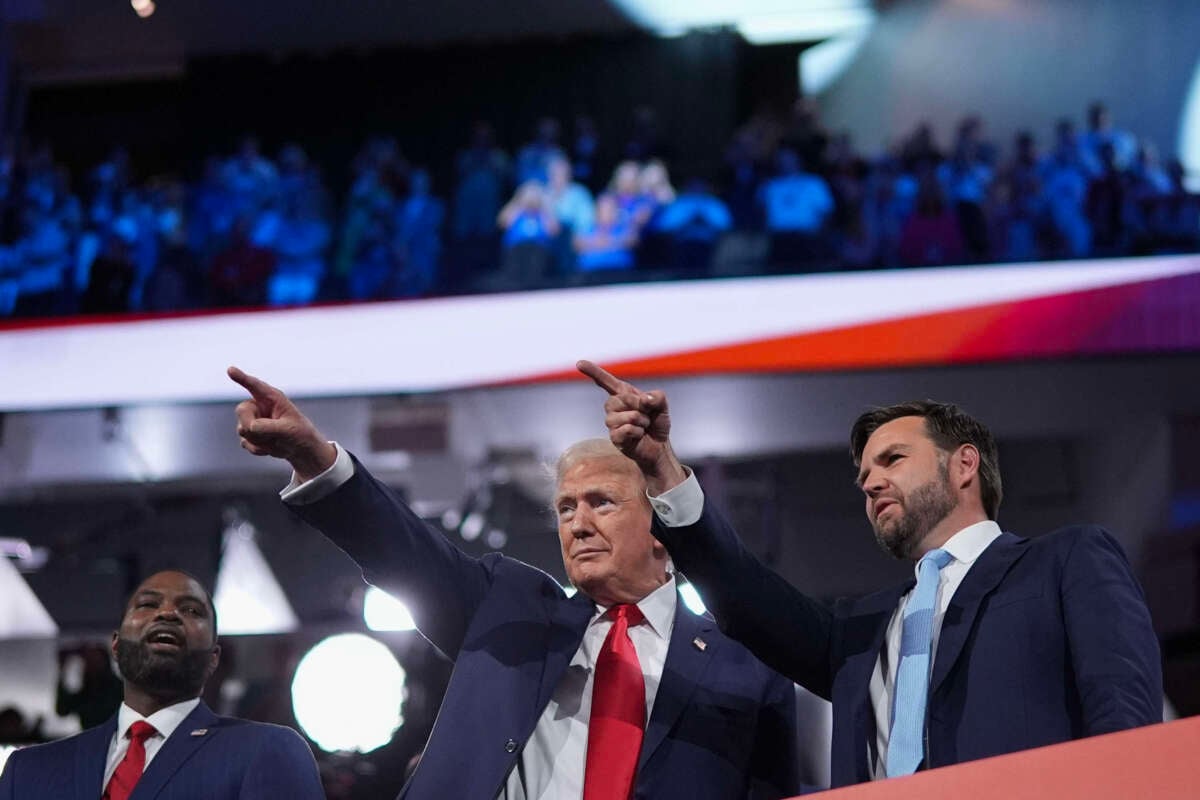A new analysis of Project 2025 contributors shows that at least five people associated with the far right roadmap for how a Trump presidency should operate have a history of making white supremacist statements.
These five individuals, who took part in crafting the Heritage Foundation document, expressed racist views against nonwhite groups, demeaned the intelligence of Black and Latinx people, and argued against the idea of birthright citizenship as established in the 14th Amendment of the Constitution. Some of these contributors also have connections with GOP presidential candidate Donald Trump, having previously worked for him in the White House or been nominated by him to serve in executive branch departments.
The analysis, published in USA Today on Monday, confirms other examinations of Project 2025 that have showcased the document’s white supremacist agenda. The missive, for example, frequently derides liberals for supposedly pushing “woke” culture, with one author in the document baselessly complaining that rules and regulations aimed at reducing racial disparities have “spread throughout the federal government with identity politics and ‘social justice’ advocacy replacing such traditional American values as patriotism, colorblindness, and even workplace competence.”
The USA Today analysis showcases how five specific contributors have repeatedly expressed white supremacist sentiments. It includes:
- Richard Hanania, who wrote racist essays under a pseudonym for years until his writings were discovered by HuffPost last year. Hanania wrote in support of eugenics and forced sterilization of “low IQ” people, which he suggested in his arguments were mostly Black people;
- Corey Stewart, a failed GOP Senate candidate from Virginia. Stewart made attacks against nonwhite immigrants and defenses of Confederate symbols centerpieces of his campaign in 2018;
- Michael Anton, a former senior national security official in the Trump White House. Anton also wrote essays under a pseudonym in 2016 that complained about a “ceaseless importation of Third World foreigners with no tradition of, taste for, or experience in liberty,” and has called for an end to birthright citizenship, with at least one academic noting that his writings were “very racist”;
- Stephen Moore, who, in 2019, was considered for a position on the Federal Reserve Board by then-President Donald Trump. Moore withdrew his nomination after past racist and misogynistic statements and jokes resurfaced;
- And Jason Richwine, a right-wing political commentator. In his PhD thesis in college, Richwine argued that Latinx people inherently had lower IQs than white people, stating that, “The prediction that new Hispanic immigrants will have low-IQ children and grandchildren is difficult to argue against.”
Notably, Project 2025 aims to reduce or dismantle numerous federal programs that have historically benefited marginalized groups, including people of color.
The far right manifesto has become a talking point for Democrats, who argue that Trump will implement much of Project 2025’s agenda if he’s elected to office again. Trump has desperately attempted to distance himself from Project 2025.
“I know nothing about Project 2025. I have not seen it, have no idea who is in charge of it, and unlike our very well received Republican Platform, had nothing to do with it,” Trump claimed earlier this month.
But Trump does have connections to contributors to Project 2025, as well as to the Heritage Foundation, which spearheaded the creation of the document. According to one examination, at least 140 people who were involved in crafting the document have worked for Trump in the past.
Trump has also previously embraced Project 2025. Speaking at a Heritage-sponsored event in 2022, Trump spoke glowingly about a project the organization was working on, vowing to use it as a blueprint for his second term in office should he win in 2024.
The document, which later became known as Project 2025, will “lay the groundwork” for the future of conservatism, Trump explained, adding that it would generate “detailed plans for exactly what our movement will do.”
Trump’s attempt to distance himself from Project 2025 may be due to a recognition that many of the proposals it contains are strongly opposed by American voters. But promoters of Project 2025 have contradicted Trump’s claims that he’s not associated with the document.
“The general sense is this is a PR gesture for [Trump] to provide himself maximum room to maneuver and avoid making any commitments at this point,” an anonymous person on the Project 2025 advisory board told NBC News. “He wants to avoid having to answer questions about anything he doesn’t want to answer questions about. Most people I know who are involved with it don’t seem overly worried that this actually constitutes a repudiation and is going to mean anything on January 20.”
Media that fights fascism
Truthout is funded almost entirely by readers — that’s why we can speak truth to power and cut against the mainstream narrative. But independent journalists at Truthout face mounting political repression under Trump.
We rely on your support to survive McCarthyist censorship. Please make a tax-deductible one-time or monthly donation.
